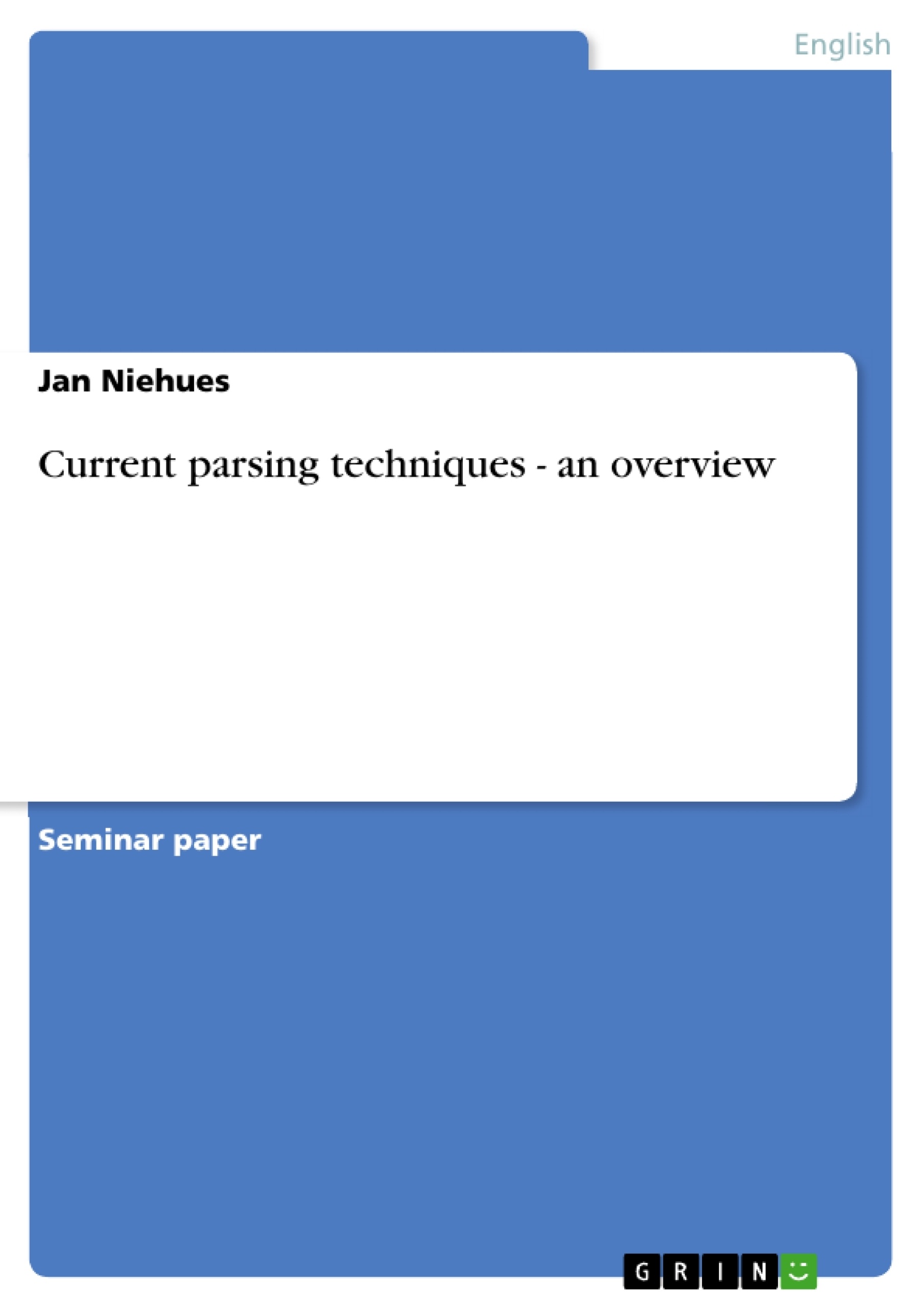This paper gives an overview of the current level of techniques used in syntactic parsing , focusing on parsing of human language. Different modes of grammatical representation and grammar types are presented as well as the different approaches to parsing (e.g. robust/shallow vs. integrative/probabilistic).
Table of Contents
- 1 Introduction
- 1.1 Introduction
- 1.2 Definitions
- 1.3 Why parse?
- 2 Input / data
- 2.1 What can be parsed?
- 2.1.1 Texts
- 2.1.2 Spoken language
- 2.2 Tagging
- 2.2.1 Tagging techniques
- 2.2.2 Output
- 3 Grammar
- 3.1 Representing syntax
- 3.1.1 Dependency Syntax
- 3.1.2 Constituent Structure Syntax
- 3.2 Grammar Types
- 3.2.1 Context Free Grammars
- 3.2.2 Probabilistic Context Free Grammars
- 4 Parsing
- 4.1 Algorithms
- 4.1.1 Direction of processing
- 4.1.2 Direction of analysis
- 4.1.3 Search strategy
- 4.1.4 Backtracking vs. Chart parsing
- 4.2 Approaches to parsing
- 4.2.1 Robust parsing
- 4.2.2 Shallow parsing
- 4.2.3 Integrative vs. sequential architectures
- 4.2.4 Probabilistic approaches
- 4.3 Ambiguity
- 4.3.1 Types of ambiguity
- 4.3.2 Disambiguation techniques
- 4.4 Evaluating parsing systems
- 4.4.1 Coverage
- 5 Conclusion
Objectives and Key Themes
This paper aims to provide an overview of current techniques used in syntactic parsing. It delves into various methods for representing grammars, conducting searches, and resolving ambiguities. The paper also explores different approaches employed in robust parsing and briefly discusses the evaluation of parser performance.- Representing syntactic structures: Dependency Syntax and Constituent Structure Syntax
- Types of grammars: Context Free Grammars and Probabilistic Context Free Grammars
- Parsing algorithms and their variations: Direction of processing, analysis, search strategy, backtracking, and chart parsing
- Robust parsing approaches: Shallow parsing, integrative vs. sequential architectures, probabilistic approaches
- Ambiguity in parsing and techniques for disambiguation
Chapter Summaries
1 Introduction
This chapter provides a brief introduction to syntactic parsing, defining the process and its significance in various fields, including natural language interfaces, information retrieval, machine translation, and semantic analysis.2 Input / data
This chapter discusses the types of input suitable for parsing, focusing on texts and spoken language. It also introduces tagging and its techniques, highlighting the process of annotating text with lexical information.3 Grammar
This chapter delves into the representation of syntax, examining Dependency Syntax and Constituent Structure Syntax. It further explores different types of grammars, including Context Free Grammars and Probabilistic Context Free Grammars.4 Parsing
This chapter explores parsing algorithms and their variations, covering aspects such as the direction of processing and analysis, search strategy, backtracking, and chart parsing. It also examines approaches to parsing, including robust parsing, shallow parsing, integrative vs. sequential architectures, and probabilistic approaches. The chapter concludes with a discussion of ambiguity in parsing and techniques for resolving it.5 Conclusion
This chapter will offer a concluding overview of the key points discussed throughout the paper, providing a final synthesis of the presented information.Keywords
This paper explores the key aspects of syntactic parsing, focusing on the representation of syntax through dependency and constituent structure syntax, different grammar types such as context-free grammars and probabilistic context-free grammars, parsing algorithms, and approaches to robust parsing. It also delves into the challenges of ambiguity and disambiguation techniques employed in parsing. Key terms include parsing, syntax, dependency syntax, constituent structure syntax, grammar, context-free grammars, probabilistic context-free grammars, algorithms, robust parsing, ambiguity, disambiguation.Frequently Asked Questions
What is syntactic parsing?
Syntactic parsing is the process of analyzing a string of symbols (human language) to determine its grammatical structure with respect to a given formal grammar.
What is the difference between Dependency and Constituent Syntax?
Dependency Syntax focuses on the binary relations between words (head and dependent), while Constituent Structure Syntax organizes words into nested groups or phrases.
How do Probabilistic Context Free Grammars (PCFG) work?
PCFGs extend standard context-free grammars by assigning probabilities to each production rule, allowing the parser to identify the most likely structure in cases of ambiguity.
What is "Shallow Parsing"?
Shallow parsing (or chunking) identifies the non-overlapping constituents of a sentence, such as noun phrases, without performing a full, deep structural analysis.
How is the performance of a parsing system evaluated?
Parsing systems are typically evaluated based on their "coverage" (how many sentences they can successfully analyze) and the accuracy of the resulting syntactic structures.
- Arbeit zitieren
- Jan Niehues (Autor:in), 2005, Current parsing techniques - an overview, München, GRIN Verlag, https://www.hausarbeiten.de/document/52290


